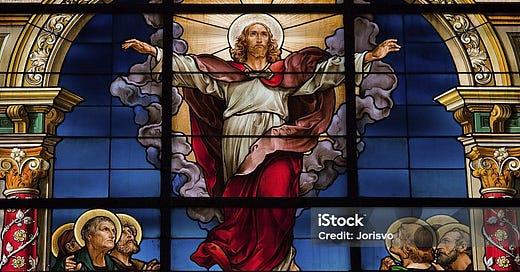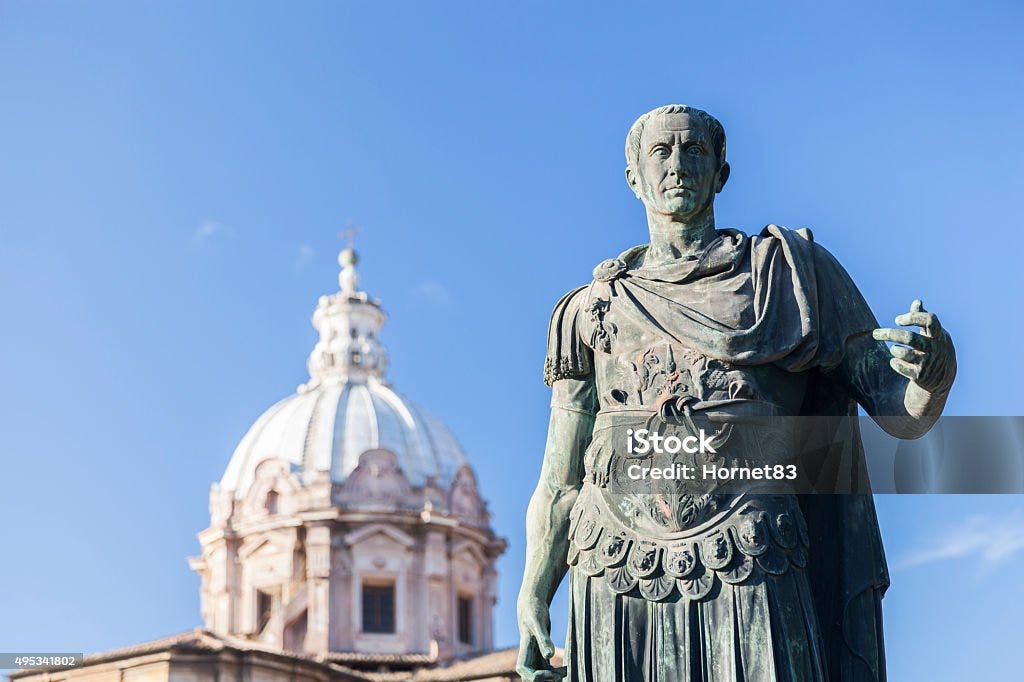Most Monday mornings in our parish church hall, there is an opportunity for any, and all to come together over coffee (other beverages are available!) and a comfort snack – maybe home-made scones, and always biscuits – to natter about whatever is on our minds. The widow of a former vicar passed by my table, yesterday, and I asked her if she was going to be in the choir on Ascension Day (this coming Thursday). She isn’t but she did wonder aloud why Jesus had to ascend seeing as we need him back “down” here, ASAP! Which, of course, set me thinking about the matter, meaning, and significance of Jesus the Christ’s Ascension.
The Ascension
(Mark 16:19–20; Luke 24:50–53)
So when they came together, they asked Him, “Lord, will You at this time restore the kingdom to Israel?” 7Jesus replied, “It is not for you to know times or seasons that the Father has fixed by His own authority. 8But you will receive power when the Holy Spirit comes upon you, and you will be My witnesses in Jerusalem, and in all Judea and Samaria, and to the ends of the earth.”
9After He had said this, they watched as He was taken up, and a cloud hid Him from their sight. 10They were looking intently into the sky as He was going, when suddenly two men dressed in white stood beside them. 11“Men of Galilee,” they said, “why do you stand here looking into the sky? This same Jesus, who has been taken from you into heaven, will come back in the same way you have seen Him go into heaven.” (Acts 1:6-11, Berean Standard Bible)
First, then, let us consider what the Ascension is, and what it signifies for us. In John’s gospel account there is no reference to the Ascension, as such; but he does quote some very important words from Jesus’ long “farewell” discourse. In John 14: 18-21 (NJB) we read, “I shall not leave you as orphans; I shall come to you [in the Holy Spirit, at Pentecost]. In a short time, the world will no longer see me; but you will see that I live and you also will live. On that day you will know that I am in my Father and you in me and I in you. Whoever holds to my commandments and keeps them is the one who loves me; and whoever loves me will be loved by my Father, and I shall love him and reveal myself to him.”
Tom (N.T.) Wright tells us that there are four important things we need to know about the Ascension. (Only four? I sometimes wish someone had told Sergius Bulgakov! More later.)
Firstly: Heaven and earth are not a long way apart. Wright explains: “They are meant to overlap and interlock and finally to be joined fully and forever…So, for Jesus, ‘going to heaven’ isn’t a matter of disappearing into the far distance… If Jesus is now ‘in heaven,’ he is present to every place on earth…The ascension enables him to be present everywhere.” (From Simply Jesus, SPCK, London, 2011, pp195-197)
There is an important fact to understand: heaven is not a “place” in the three-dimensional sense in which we usually understand “place”. “Heaven” and indeed, “Earth” would better be understood as dimensions of existence. Bulgakov writes:
“To be sure, the Ascension to heaven is not Christ’s departure into the astronomical space of the stars and galaxies, and in general it is not a departure to some other place, for ‘heaven’ is not a place, and in any case, it is not another place in relation to the earth. The Ascension signifies not a physical but a metaphysical departure from the world, analogous to Christ’s metaphysical descent from heaven to earth, which resulted in His physical presence on the earth…And this return into the bosom of the Holy Trinity also signifies the sitting of Christ at the right hand [executive authority – “CEO”] of the Father; this position at the right hand of the Father pre-eternally belongs to the Son and is returned to Him in His Ascension.” (The Lamb of God, Sergius Bulgakov, Eardman,2008, p392)
Secondly: Heaven is the place from which the world is run. “It is,” suggests Wright, “the CEO’s office,” [or “the right hand of the Father.”]
Thirdly: Jesus, the “Son of Man” would come into his kingdom – and the disciples would see it. (Matt. 16:28) As the citation from Luke (in Acts) tells us, Jesus was seen to be “lifted up” and taken out of sight by “a cloud.” So, if ‘heaven’ and ‘earth’ are not far apart but meet together in and through Jesus, why this “depiction of apparent ‘vertical’ movement in Luke’s account?” asks Wright. He suggests that Luke wants to “evoke the memory” of the key prophetic passage in Daniel 7:13, in which one “like the Son of Man” comes on the clouds of heaven “to be presented before and enthroned beside one who is called ‘The Anointed One’.” “This,” explains Wright, “is the great reversal, the moment when God welcomes the One who has suffered as Israel’s representative at the hands of the monsters and is now to exercise judgment over them.” (Op Cit 195-197)
Fourthly: Caeser is not the “son of God,” as his adopted son, Augustus, proclaimed (the so-called “good news – gospel or evangelion”). No, Jesus is LORD and upstages Caeser, exercising His power as the true CEO of earth and heaven who sends us, his followers, and ambassadors, to announce and exemplify the kingdom of heaven as an earthly reality.
In Surprised by Hope (SPCK, London, 2011 pp125-126) Tom Wright adds another dimension to our understanding of the Ascension and the way in which the Church embodies Christ. He writes,
The Ascension speaks of the Jesus who remains truly human [there is a Man on the Throne!] and hence in an important sense absent from us while in another equally important sense present to us in a new way. At this point the Holy Spirit and the sacraments become enormously important since they are precisely the means by which Jesus is present…The lordship of Jesus; the fact that there is already a human being at the helm of the world; his present intercession for us – all this is over and above his presence with us. It is even over and above our sense of that presence, which, of course, comes and goes with our own moods and circumstances.
Bulgakov explains this concept more deeply:
It is [the] spiritual reality of the ascended body of Christ, the energetic perfection of this body, that makes possible its mysterious abiding in the world. The ascended body is the Church, and it is the Eucharistic body of the Lord. The Lord is spiritually present on earth in His Church, which is His true “omnipresence.” He returns to earth in the Divine Eucharist; He clothes Himself in His glorified body, and He mysteriously includes the Eucharistic elements, the Sacred Gifts, in His glorified body for spiritual and corporal communion.” (Bulgakov, Op Cit p396)
It seems to me, in passing, that in this Eucharistic sense, there is an explanation for Paul’s warning, when he writes to the church in Corinth:
For I received from the Lord what I also passed on to you: The Lord Jesus, on the night He was betrayed, took bread, 24and when He had given thanks, He broke it and said, “This is My body, which is for you; do this in remembrance [‘re-embodiment’] of Me.” 25In the same way, after supper He took the cup, saying, “This cup is the new covenant in My blood; do this, as often as you drink it, in remembrance of Me.” 26For as often as you eat this bread and drink this cup, you proclaim the Lord’s death until He comes.
27Therefore, whoever eats the bread or drinks the cup of the Lord in an unworthy manner will be guilty of sinning against the body and blood of the Lord. 28Each one must examine himself before he eats of the bread and drinks of the cup. 29For anyone who eats and drinks without recognizing [‘discerning’] the body eats and drinks judgment on himself. 30That is why many among you are weak and sick, and a number of you have fallen asleep. (1 Cor.11: 23-30 The Berean Standard Bible)
I hope to return to the theme of the “Lord’s Supper,” or “Holy Communion - Eucharist” in a later posting.
Our celebration of the Ascension of Jesus the Christ is necessary, jubilantly humbling, prophetic, and empowering. In it, we embrace not only the power of the Holy Spirit poured out on all flesh, but also the embodiment of Christ in us – and us in Christ through the Holy Spirit, our hope of glory; Christ as us, the Temple of God, and our “innermost being” as its Holy of Holies. We acknowledge in wonder, humility, and gratitude that we too are raised up with Christ to sit at the right hand – the executive authority – of God our Father as kings and priests to God on behalf of all Creation!
So it is, then, that on this day we know that Christ Jesus is in the Father, we are in Him and He is in us. As Paul wrote elsewhere, “all things belong to [us]; we belong to Christ; and Christ belongs to God.
Let our Ascension anthems arise: ALLELUIA!
AMEN!
Go well, fellow Wayfarers.
Extra! Extra! Here I will share a desert thought from the collection by Mercy Aiken who works with the Network of Evangelicals For The Middle East and who co-wrote Yet in The Dark Streets Shining – A Palestinian Story of Hope & Resilience in Bethlehem with Bishara Awad.
"In a heartbeat, he understands why religions are born on the sands – there is nothing here for a man but his own mind." --Sara Sheridan
"Everything looked too far away, even the cloudless sky. There was nowhere you could hide in such emptiness." --James Carlos Blake







